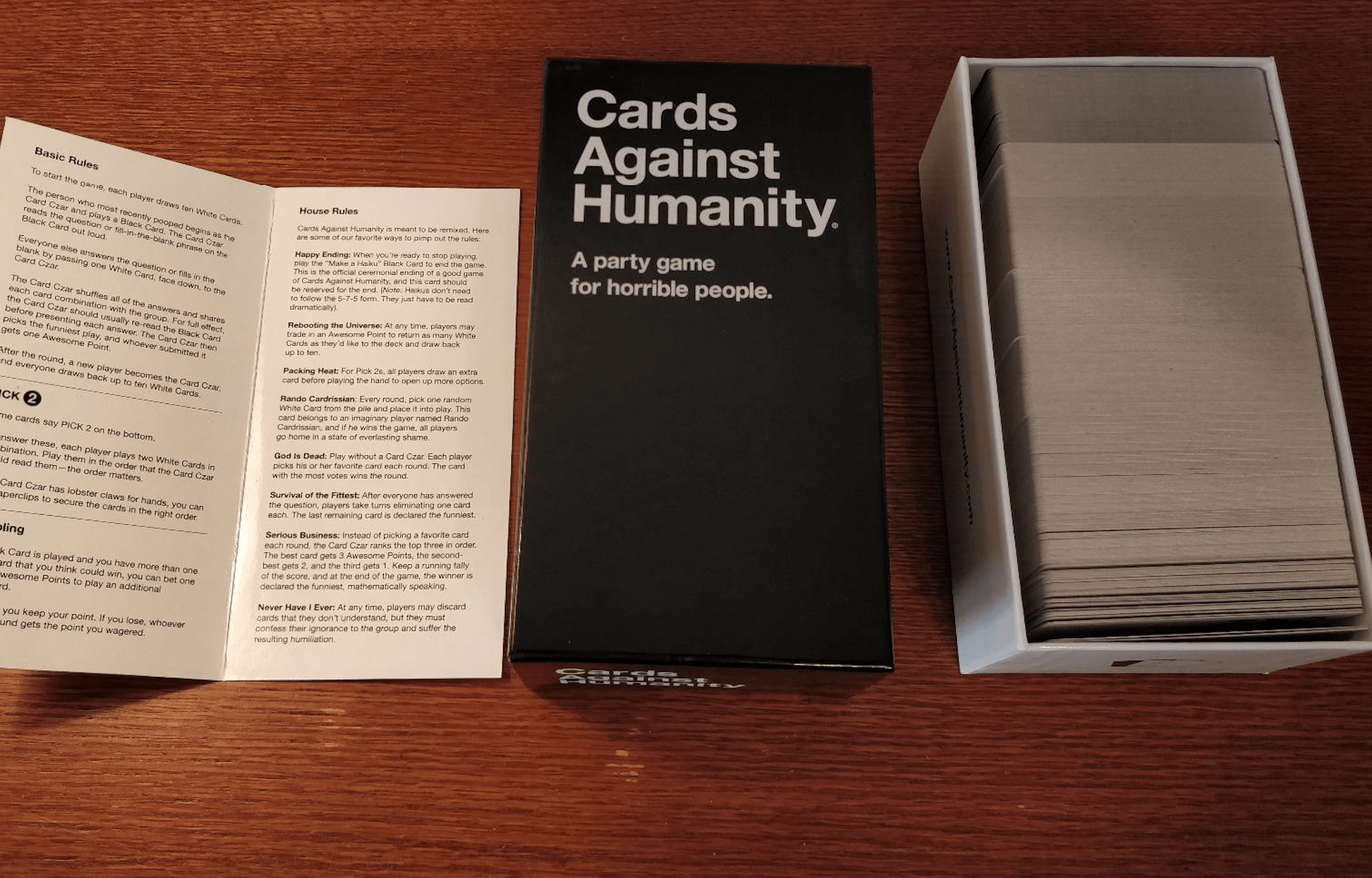“Cards Against Humanity” has been a staple game from my teenage years onward across many different friend groups, and I was excited for the opportunity to pick up the black and white cards again for this analysis. Going in, I was conscious of two properties of this game that have always surprised me from a from a design standpoint that I wanted to observe more analytically: first, that the game – despite being overtly offensive in ways that would not be tolerated in other contexts – not only succeeds in bringing people together but appeals widely to virtually everyone I’ve ever known regardless of their sensitivity levels to offensive content, and two that even when playing with extremely competitive friends who normally would relish in the opportunity to win a competition, typically are not at all interested in the win/loss mechanics of the game and are instead happy to completely forget the ‘score’ altogether, only caring about the currency of laughter and enjoyment.
Before we continue, as you already know, “Cards Against Humanity” is a card game designed for a group of mature players who are tasked with filling in blanks in statements with phrases from a deck of filler responses typically containing politically incorrect, classically inappropriate, or outright offensive content. The game was designed by high school friends Josh Dillon, Daniel Dranove, Eli Halpern, Ben Hantoot, David Munk, David Pinsof, Max Temkin & Eliot Weinstein and self-published in 2011 by Cards Against Humanity LLC.
I’d expect many of my peers would argue the game’s card selecting and judging mechanic is primarily engaging self expression as a primary aesthetic, however I’d like to provide a counterpoint to that view. After playing again this week, I argue that the judging mechanic circuitously activates pastime as Cards Against Humanity’s primary game aesthetic. I find fascinating that the activation of this aesthetic is only possible through the presence of faux competition mechanics, like judging, which in a sense give the players a ‘pass’ to break social norms in the name of pursing victory as the implied justification for what would normally be offensive social faux pas. The presence of judging as a mechanic and the subsequent desire to ‘win’ result is an emergent outcome that allows competition to actually be de-emphasized over time and allow the players to have a good laugh together. Of course, fellowship is also a core aesthetic of the game, but this is so obvious as to be uninteresting, and I’m more interested in how pastime is generated through the game’s limited mechanics that seem at first glance to promote competition instead.
My recent play through of the game provides what I see as compelling empirical evidence for the Cards Against Humanity as a game that subtly fosters pastime over competition among the fellow players. For example, winning and losing rounds relies very heavily on the fellowship of the players (knowing what they would find funny), but the emergent properties of the game caused my friends to simply choose cards they find the most funny, rather than what might cause them to ‘win’ the round. For example, during our game play, someone used the card “The hardworking Mexican” when one of our friends of Mexican-descent was the Card Czar, and although he (feigning offense in a way that was purely funny) did not choose that card as the winner, it was a great fellowship building moment of group laughter. And if I remember correctly, by this point we were no longer keeping score. This and many other similar examples demonstrate how the pretense of tying to win gives players the opportunity to break social norms, but winning isn’t the primary motivation for action, rather the emergent fun is fellowship and pastime with your friends. Unlike Apples to Apples, which I feel primarily leverages a competitive aesthetic through straightforward card matching of cards which are ‘funny’ but not really, Cards Against Humanity transforms its judging mechanic into a vehicle for pastime, subtly shifting the focus from winning to enhancing communal laughter and social interaction.
I don’t think the game needs explicit tweaking by game designers, as I think players do that intuitively. For example, I checked the rules and a saw that the Card Czar is supposed to be the player “who most recently pooped,” but we just rotated card czar every turn instead as this seems to be more fair and more fun.
I certainly look forward to playing (not necessarily winning or losing) this game again soon!




